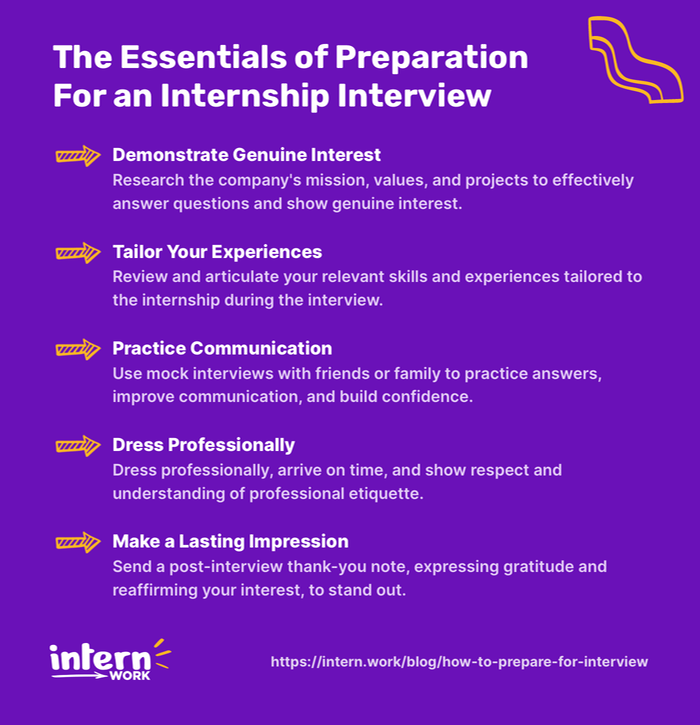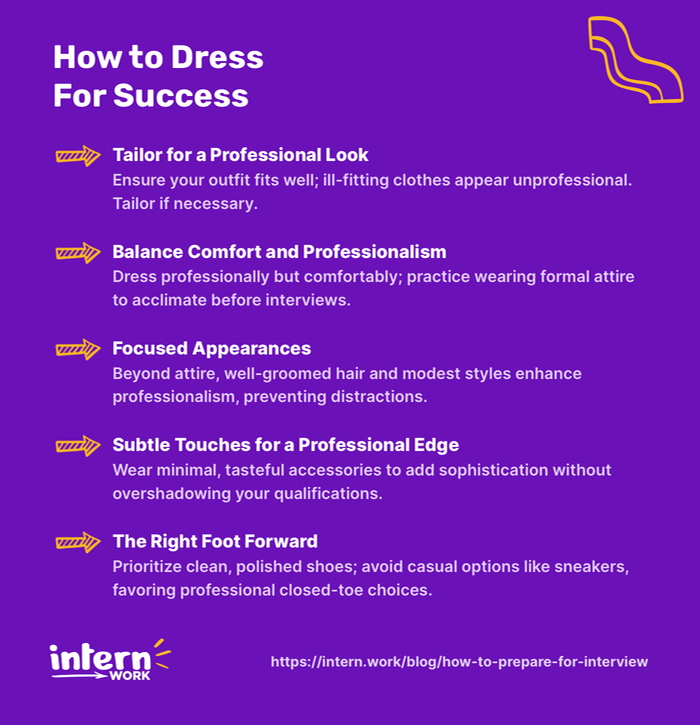
Are you excited about the opportunity to land an internship? Are you ready to take your first step towards building your professional career? Well, before you can embark on this exciting journey, there’s one crucial hurdle you need to cross - the internship interview. But don’t worry, with the right preparation, you can ace it! In this article, we will guide you through the entire process, from understanding the basics of an internship interview to post-interview follow-up. So let’s get started!
The Basics of an Internship Interview
Before we delve into the preparation process, let’s define what an internship interview is. An internship interview is a structured conversation between you and a potential employer to assess your qualifications, skills, and suitability for the internship position. It’s an opportunity for the employer to get to know you better and for you to demonstrate why you’re the perfect fit for the role.
Internship interviews are a crucial step in the hiring process, as they allow employers to gauge your potential and determine if you have the necessary skills and qualities to contribute to their organization. These interviews are designed to evaluate your ability to handle the responsibilities of the internship, your level of professionalism, and your compatibility with the company culture.
During an internship interview, you can expect to be asked a variety of questions that will assess your knowledge, experience, and problem-solving skills. These questions may range from behavioral and situational inquiries to technical and industry-specific queries. It’s essential to prepare thoroughly and anticipate the types of questions you may encounter.
Furthermore, an internship interview is not just an opportunity for the employer to evaluate you; it’s also a chance for you to assess the company and determine if it aligns with your career goals and aspirations. Use this time to ask insightful questions about the company’s values, work environment, and growth opportunities.
The Essentials of Preparation
Now that we understand the importance of internship interviews, let’s explore how you can prepare yourself to make a lasting impression!
-
Demonstrate Genuine Interest
Preparation is key when it comes to internship interviews. Start by researching the company extensively. Familiarize yourself with their mission, values, and recent projects. This knowledge will not only help you answer questions more effectively but also demonstrate your genuine interest in the organization.
-
Tailor Your Experiences
Next, review your own qualifications and experiences. Identify key skills and accomplishments that are relevant to the internship position you’re applying for. Consider how you can articulate these experiences in a concise and compelling manner during the interview.
-
Practice Communication
Practice is crucial to build confidence and improve your interview performance. Enlist the help of a friend or family member to conduct mock interviews. This will allow you to practice answering common interview questions and receive feedback on your communication style and body language.
-
Dress Professionally
In addition to preparing your answers, it’s essential to dress professionally and arrive on time for the interview. Dressing appropriately shows respect for the opportunity and demonstrates your understanding of professional standards. Arriving early allows you to compose yourself and gather your thoughts before the interview begins.
-
Make a Lasting Impression
Lastly, don’t forget to follow-up with a thank-you note or email after the interview. Express your gratitude for the opportunity to interview and reiterate your interest in the internship position. This simple gesture can leave a positive impression and set you apart from other candidates.

Pre-Interview Preparation
Researching the company you are interviewing with is essential. Familiarize yourself with their mission, values, and recent accomplishments. This will help you tailor your answers during the interview and demonstrate that you have a genuine interest in the organization.
When researching the company, it’s important to go beyond just their website. Look for news articles, press releases, and social media posts to get a comprehensive understanding of their current initiatives and industry presence. By doing so, you’ll be able to speak confidently about their recent accomplishments and show that you are up-to-date with their activities.
Furthermore, take the time to explore the company’s culture and values. Look for any information on their employee programs, diversity and inclusion initiatives, or corporate social responsibility efforts. Understanding these aspects will not only help you tailor your answers but also allow you to assess if the company’s values align with your own.
Additionally, make sure to understand the internship role you have applied for. Take the time to review the job description thoroughly, noting the required skills and responsibilities. This will help you prepare specific examples and anecdotes that demonstrate your suitability for the position.
As you review the job description, pay attention to any keywords or phrases that are mentioned repeatedly. These are likely to be the core competencies the company is looking for in an intern. Make a note of these and think about how you can showcase your skills and experiences in those areas during the interview.
By demonstrating your knowledge and understanding of the company’s mission, values, and recent accomplishments, you will leave a lasting impression on the interviewer and increase your chances of success.
What to Wear to an Internship Interview
Your appearance can create a lasting impression on the interviewer. Begin by investigating the company’s dress code. Are they formal or more relaxed in their attire? Once you have decoded their dress code, choose an outfit that is professional, neat, and reflects your understanding of their expectations.
In addition to the clothes you wear, pay attention to grooming and accessories. Opt for well-maintained hair, minimal jewelry, and polished shoes. Remember, dressing for success means projecting professionalism from head to toe!
When it comes to dressing for success, it’s not just about following a set of rules. It’s about understanding the culture and values of the company you are interviewing with. By doing your research and aligning your attire with their expectations, you are showing that you are serious about the opportunity and that you respect their organization.
How to Dress For Success
Different industries have different standards when it comes to dressing professionally. For example, if you are interviewing for a corporate job in finance or law, a more formal and conservative outfit would be appropriate. On the other hand, if you are applying for a creative position in a startup or advertising agency, you may have more flexibility to showcase your personal style.
-
Tailor for a Professional Look
When selecting your outfit, it’s crucial to ensure that it fits you well and makes you feel confident. Ill-fitting clothes can give off a sloppy and unprofessional impression, regardless of how stylish they may be. Take the time to try on different options and consider getting your clothes tailored if needed.
-
Balance Comfort and Professionalism
While it’s important to dress professionally, it’s equally important to feel comfortable in what you are wearing. If you are not used to wearing formal attire, it’s a good idea to practice wearing it before the interview. This will help you get accustomed to the fit and feel of the clothes, allowing you to focus on the interview itself rather than worrying about your outfit.
-
Focused Appearances
Remember that dressing for success goes beyond just the clothes you wear. Grooming plays a significant role in creating a polished and professional appearance. Make sure your hair is well-groomed and styled appropriately for the occasion. Avoid excessive hairstyles or colors that may distract the interviewer from focusing on your qualifications.
-
Subtle Touches for a Professional Edge
Accessories can also make a difference in your overall appearance. Keep them minimal and tasteful. A simple watch or a pair of stud earrings can add a touch of sophistication without overpowering your outfit. Avoid wearing flashy or distracting accessories that may divert attention away from your skills and qualifications.
-
The Right Foot Forward
Lastly, don’t forget about your shoes. They may seem like a small detail, but they can make a big impact. Make sure your shoes are clean, polished, and appropriate for the occasion. Avoid wearing sneakers or sandals, even if the company has a more relaxed dress code. Opt for closed-toe shoes that are comfortable and professional-looking.

Dressing for success is about more than just wearing the right clothes. By paying attention to details such as grooming, accessories, and shoes, you can create a lasting impression that showcases your professionalism and suitability for the job.
What to Bring to an Internship Interview
Internship interviews can set the trajectory for your future career, so it’s essential to come prepared. Packing the right items can not only increase your confidence but also demonstrate your diligence and professionalism to potential employers.
Essential Documents
Always have these on hand. These are non-negotiables:
-
Multiple Copies of Your Resume
Bring several clean, crisp copies. You never know how many interviewers there might be, and it’s a good practice to offer each one a copy.
-
Portfolio
If you’re in a field that values portfolios (like graphic design, writing, or architecture), bring a well-organized portfolio of your work. If possible, have both a digital and a hard copy.
-
List of References
Though not always asked for during the initial interview, it’s good to have a list of two or three references, complete with their current job titles, companies, and contact information.
-
Transcripts and Certifications
Especially relevant for recent graduates or those in specialized fields, transcripts can underscore your academic achievements, while certifications can prove expertise in certain areas.
Personal Essentials
These might seem obvious, but you’d be surprised at what can be overlooked in the nervous hours leading up to the interview:
-
A Professional Notebook and Pen
For jotting down notes, questions, or important points.
-
Identification
Some companies may need this for security or sign-in purposes.
-
Directions and Contact Information
Have a physical copy or screenshot in case technology fails. It’s always a good idea to have the interviewer’s phone number in case you’re running late or can’t find the location.
-
Breath Mints
Ensure your breath is fresh. But avoid chewing gum during the interview.
Remember, an internship interview is not just about showcasing your skills and qualifications, but also about demonstrating your commitment, preparedness, and professionalism. By ensuring you bring these essentials, you can put your best foot forward, leaving a lasting impression on potential employers.
On the Day of the Interview
The big day has arrived! This is your opportunity to showcase your skills and impress the interviewer. Arriving at least 15 minutes before your scheduled interview time is crucial. This not only allows you some breathing space but also shows your punctuality and professionalism. Use this extra time to gather your thoughts, review your notes, and mentally prepare for the interview.
Remember, first impressions matter. As soon as you enter the building, make sure to greet the receptionist or any other staff you encounter with a friendly demeanor. You never know who might provide feedback to the interviewer! A warm smile, a polite greeting, and a confident posture can go a long way in creating a positive impression.
While waiting for your interview, take the opportunity to observe your surroundings. Pay attention to the office environment, the company culture, and the interactions between employees. This information can help you tailor your responses during the interview and demonstrate your understanding of the company’s values and goals.
As you wait, avoid distractions such as excessive phone use or fidgeting. Instead, take this time to review your resume and practice your elevator pitch. Remind yourself of your key accomplishments, strengths, and experiences that make you a strong fit for the position.
When it’s time for the interview, take a deep breath and walk into the room with confidence. Remember to maintain eye contact, offer a firm handshake, and introduce yourself clearly. Be attentive and engaged throughout the interview, listening carefully to the questions and providing thoughtful responses.
Throughout the interview, don’t be afraid to ask questions of your own. This not only shows your interest in the role but also allows you to gather more information about the company and the position. Prepare a list of questions in advance, focusing on topics such as company culture, team dynamics, and opportunities for growth.
As the interview comes to a close, thank the interviewer for their time and express your continued interest in the position. Ask about the next steps in the hiring process and inquire about the timeline for a decision. This demonstrates your enthusiasm and proactive approach.
After the interview, take a moment to reflect on your performance. Identify areas where you excelled and areas where you could improve. Use this self-assessment to refine your interview skills and make adjustments for future opportunities.
The interview is not only an opportunity for the company to evaluate you, but also for you to evaluate the company. Take note of your overall experience, the professionalism of the interviewers, and the company’s values. This will help you make an informed decision if you receive an offer.
Navigating the Interview Process
The interview process can consist of various stages, and it’s crucial to make a good first impression. Begin by offering a firm handshake and maintaining eye contact. These simple gestures show confidence and respect.
During the interview, listen carefully to the questions asked. Take a moment to gather your thoughts and provide well-structured answers, incorporating relevant examples from your experiences. It’s also important to ask questions of your own, demonstrating your curiosity and enthusiasm for the opportunity.
As you navigate through the interview process, it’s essential to research the company beforehand. Familiarize yourself with their mission, values, and recent achievements. This knowledge will not only impress the interviewer but also help you tailor your answers to align with the company’s goals.
Furthermore, don’t forget to dress appropriately for the interview. Your attire should reflect professionalism and respect for the occasion. Dressing in a neat and presentable manner will leave a lasting positive impression on the interviewer.
Another crucial aspect of the interview process is body language. Pay attention to your posture and maintain an open and engaged stance. Avoid fidgeting or slouching, as these can convey a lack of confidence. Instead, sit up straight and lean slightly forward to show attentiveness and interest.
In addition to your verbal communication, non-verbal cues also play a significant role in the interview process. Smile genuinely and maintain a friendly demeanor throughout the conversation. A warm and approachable attitude will help establish a connection with the interviewer and create a positive rapport.
Remember to showcase your unique skills and experiences during the interview. Highlight your accomplishments and provide specific examples of how you have contributed to previous projects or teams. This will demonstrate your value and make you stand out as a strong candidate.
Lastly, follow up with a thank-you note or email after the interview. Express your gratitude for the opportunity to interview and reiterate your interest in the position. This small gesture shows professionalism and leaves a positive impression on the interviewer.
Post-Interview Follow Up
Once the interview is over, it’s essential to follow up with a thank you note. This simple gesture shows gratitude and keeps you fresh in the hiring manager’s mind. Take this opportunity to reiterate your interest in the position and any additional points you may have missed during the interview.
Writing a thank you note after an interview is not only a polite gesture but also a strategic move. It allows you to express your appreciation for the interviewer’s time and consideration, while also reminding them of your qualifications and enthusiasm for the role. In your thank you note, you can mention specific aspects of the interview that stood out to you or highlight any relevant experiences or skills that you forgot to mention during the conversation.
While waiting for the final decision, it’s natural to feel a mix of excitement and anxiety. This is the perfect time to reflect on your performance and evaluate how you did during the interview. Think about the questions you were asked and how you responded to them. Consider what went well and areas where you can improve.
Reflecting on your performance is not about dwelling on mistakes or beating yourself up over perceived shortcomings. Instead, it’s an opportunity for growth and development. Each interview experience, regardless of the outcome, provides valuable insights into your strengths and weaknesses. By taking the time to assess your performance, you can identify areas where you can enhance your skills or prepare better for future interviews.
Remember, staying positive during the waiting period is crucial. It’s easy to get caught up in self-doubt or worry about the outcome, but maintaining a positive mindset can make a significant difference. Trust that you did your best during the interview and that the hiring manager will make a decision that aligns with their needs and the qualifications you presented.
While waiting, you can also use this time to explore other opportunities or continue your job search. Don’t put all your eggs in one basket, as they say. Keep networking, attending job fairs, and applying to other positions that interest you. By diversifying your efforts, you increase your chances of finding the right opportunity that matches your skills and career goals.
Next Steps After the Interview
After the interview, it’s time to be patient and wait for the hiring manager’s decision. In the meantime, continue seeking other internship opportunities and stay proactive in your job search. Remember, the right opportunity is out there – it’s just a matter of time before you find it.
Key Takeaways
- An internship interview is a structured conversation between you and a potential employer to assess your qualifications, skills, and suitability for the position. It's a chance for both parties to get to know each other and determine if there's a fit.
- Preparation is key for success in internship interviews. Research the company extensively, review your qualifications, and practice your answers to common interview questions. Dress appropriately, arrive on time, and gather materials like your resume and portfolio.
- Extensive company research goes beyond the website. Explore news articles, press releases, and social media to understand the company's mission, values, recent projects, and industry presence. This knowledge helps tailor your responses and demonstrate genuine interest.
- Dressing appropriately showcases professionalism. Understand the company's dress code and industry standards. Select well-fitting clothes, pay attention to grooming and accessories, and project confidence and comfort in your attire.
- Arrive at least 15 minutes early, greet staff with respect, and observe the office environment. Focus on first impressions, maintain eye contact, and offer a firm handshake. Stay attentive, listen carefully, and engage with thoughtful responses. Ask insightful questions about company culture and growth opportunities.
- Navigating the interview process involves a firm handshake, attentive listening, well-structured answers, and asking questions. Research the company, adhere to appropriate attire, maintain positive body language, and highlight unique skills and experiences.
- After the interview, send a thank-you note expressing gratitude, reiterating interest, and mentioning any points you might have missed. Reflect on your performance, focusing on strengths and areas for improvement. Stay positive during the waiting period and continue exploring other opportunities.
Wrapping Up
In conclusion, preparing for an internship interview requires dedication and effort. By understanding the basics, conducting thorough research, dressing appropriately, and navigating the interview process with confidence, you are on your way to success. And remember, even if the outcome is not what you expected, each experience is a valuable stepping stone in your professional journey. So go ahead, put your best foot forward, and prepare for the internship interview of a lifetime!






